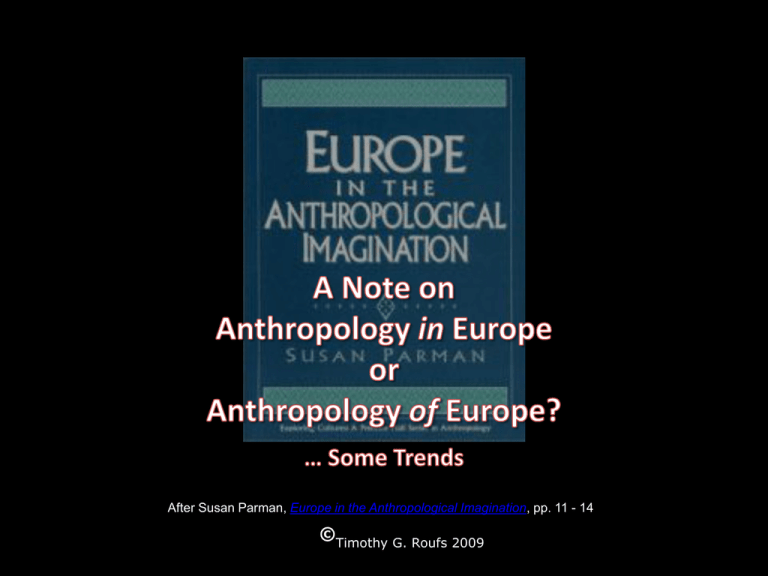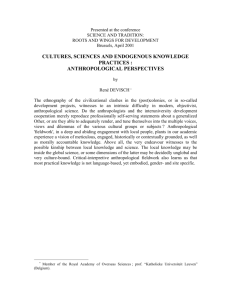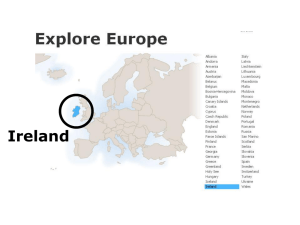© , , pp. 11 - 14 Timothy G. Roufs 2009
advertisement

After Susan Parman, Europe in the Anthropological Imagination, pp. 11 - 14 ©Timothy G. Roufs 2009 • in the 1970s anthropologists became caught up in a surge of interest in world systems, processes that could be described independent of particular “culture areas” Susan Parman, Europe in the Anthropological Imagination, pp. 14 - 16 – urbanism – transnationalism – gender issues – migration Susan Parman, Europe in the Anthropological Imagination, pp. 14 - 16 • these were universal processes, and anthropology was conceived of as a universal science of humankind – not just of the exotic, nonWestern, savage “Other” Susan Parman, Europe in the Anthropological Imagination, pp. 14 - 16 • as Caroline B. Brettell notes, urban anthropology began to appear as a distinct subdiscipline in the early 1970s, as indicated by the appearance of a new journal in 1972, and the publication of edited collections Susan Parman, Europe in the Anthropological Imagination, pp. 14 - 16 another topic of interest was migration Susan Parman, Europe in the Anthropological Imagination, pp. 14 - 16 • William A. Douglass argues that despite the appearance of the isolated peasant community as the typical focus of early Europeanist anthropology, the theme of migration was a constant thread … Susan Parman, Europe in the Anthropological Imagination, pp. 14 - 16 • Caroline Brettell notes that the 1970s also saw the beginning not only of urban anthropology but also of gender studies • e.g., Rosaldo and Lamphere 1974 Susan Parman, Europe in the Anthropological Imagination, pp. 14 - 16 • today issues of gender in Europe vary from honor and shame in the Mediterranean to ... • general issues of the status of women • their power • their role in migration • the construction of gender identity • the poetics of genders Susan Parman, Europe in the Anthropological Imagination, pp. 14 - 16 • processes were universal • where they took place was of interest only in providing additional evidence about the nature of the processes themselves Susan Parman, Europe in the Anthropological Imagination, pp. 14 - 16 • on the other hand, going to Europe was essential in the “anthropological imagination” because it validated the universality of anthropological models – thus separating it from its image as a discipline relevant only to the study of the exotic, the “primitive,” and the non-West Susan Parman, Europe in the Anthropological Imagination, pp. 14 - 16 • in choosing to go to Europe, Susanna Hoffman, producer of the film Kypseli, was testing the question of universality of anthropological models Susan Parman, Europe in the Anthropological Imagination, pp. 14 - 16 • according to Mark T. Shutes, this same motivation lay behind George Peter Murdock attempting to add more European material to the Human Relations Area Files, so as to expand the scope of ethnographic examples Susan Parman, Europe in the Anthropological Imagination, pp. 14 - 16 • one can argue that studying Europe was a byproduct of the expanding interest of anthropologists in all cultures, including those of the West Susan Parman, Europe in the Anthropological Imagination, pp. 14 - 16 • but it is also important to point out that the very fact of studying Europe made it easier to ask certain kinds of questions … Susan Parman, Europe in the Anthropological Imagination, pp. 14 - 16 • for example, given assumptions about Westerners, it may be easier to pose research problems emphasizing decisionmaking individuals … Susan Parman, Europe in the Anthropological Imagination, pp. 14 - 16 • it is also possible that new areas of interest can be more easily explored in Europe – because Europe was not recognized as an acceptable, fully authentic, legitimate place for an anthropologist to do anthropological fieldwork … Susan Parman, Europe in the Anthropological Imagination, pp. 14 - 16 • therefore, if an anthropologist works in Europe, it is more likely that s/he would borrow from other disciplines Susan Parman, Europe in the Anthropological Imagination, pp. 14 - 16 • through their work on Europe, anthropologists have become more interdisciplinary, drawing on … – history (Brettell, Rogers; Kertzer ...) – political economy (Brettell, Kertzer) – political science (Wilson) – demography (Douglass) Susan Parman, Europe in the Anthropological Imagination, pp. 14 - 16 • … many of the authors make a good case for anthropology to move out of the exotic margins and into the familiar centers of power, complexity, and hugeness – to use Rogers’s example, to ‘move from Vasilika to Versailles’ Susan Parman, Europe in the Anthropological Imagination, pp. 14 - 16 • ... many of the authors make a good case for anthropology to move out of the exotic margins and into the familiar centers of power, complexity, and hugeness – to use Rogers’s example, to ‘move from Vasilika to Versailles’ Susan Parman, Europe in the Anthropological Imagination, pp. 14 - 16 • Susan Parman, however, suggests that “wherever we pitch our tents (in small island peasant communities or in the back offices of high-powered Eurocrats), we should do our best to preserve the sense of the strange in the heart of the familiar — to disorient (not to Orient)” … Susan Parman, Europe in the Anthropological Imagination, pp. 14 - 16 “The ability of anthropologists to … – apply a cross-cultural perspective – turn the familiar on edge – develop a sense of distance from and cultural critique of what we take for granted … is what will make or break a successful anthropology of Europe” Susan Parman, Europe in the Anthropological Imagination, pp. 14 - 16 “The ability of anthropologists to … – apply a cross-cultural perspective – turn the familiar on edge – develop a sense of distance from and cultural critique of what we take for granted … is what will make or break a successful anthropology of Europe” Susan Parman, Europe in the Anthropological Imagination, pp. 14 - 16 “... by studying Europe, anthropologists are in a position to dissolve the binary opposition of “Us” / “Other” with which anthropology has been engaged as part of its cultural heritage” Susan Parman, Europe in the Anthropological Imagination, pp. 14 - 16 After Susan Parman, Europe in the Anthropological Imagination, pp. 11 - 14 ©Timothy G. Roufs 2009


